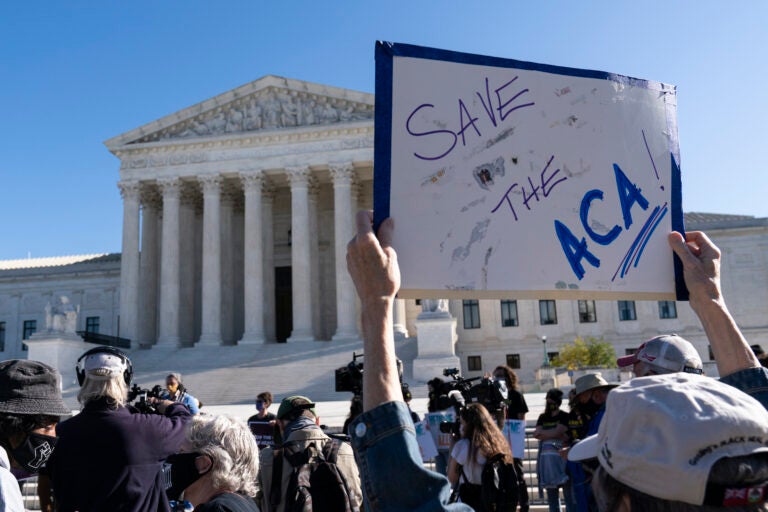Obamacare before the Supreme Court…yet again
We discuss the Republican challenge to the Affordable Care Act that is before the Supreme Court.
Listen 49:45
A demonstrator holds a sign in front of the U.S. Supreme Court as arguments are heard about the Affordable Care Act, Tuesday, Nov. 10, 2020, in Washington. (AP Photo/Alex Brandon)
The Supreme Court yesterday heard oral arguments in a Republican challenge to the Affordable Care Act. This is the third time the high court has heard arguments against the decade-old law but now, with the newly appointed Justice Barrett, there’s a larger conservative majority. At the center of the case is the “individual mandate,” which originally required Americans to buy health insurance or pay a fine, however the fine was reduced to $0 by Congress in 2017. The Republicans charge that this change makes the law unconstitutional. This hour we discuss the hearing and the arguments around whether the mandate can be removed and the law upheld with JULIE ROVNER, chief Washington correspondent for Kaiser Health News, and ALLISON HOFFMAN, professor at the University of Pennsylvania Law School. We’ll also discuss what this latest challenge means for the more than 20 million Americans who get their health coverage from the ACA.

Subscribe for more Radio Times
Interview highlights
On the background of the Republican argument against the ACA
Marty Moss-Coane: How did the mandate become the center of this constitutional argument?
Julie Rovner: Back in 2017, the Republicans came right out of the gate when President Trump was inaugurated and said they were going to repeal and replace the Affordable Care Act. Of course, Republicans in the seven years that they’d been trying to come up with a replacement had not been able to agree among themselves. And in the end, with that rather famous thumbs down from John McCain, they were not able to repeal and replace the law. So they moved on to a big tax cut bill that they were planning to do after they did the health care. And as part of that tax cut bill, they thought they would get rid of the most hated piece of the Affordable Care Act, which is the penalty for not having insurance. But because of the budget reconciliation technique they were using, which enabled them to pass tax, but with only 50 votes rather than the usual 60 in the Senate, they could not take out the mandate itself. But they could lower the penalty to zero. And that’s what they did. And then a couple of months later, these Republican Attorneys General said, in 2012 the Supreme Court said that the law was only constitutional because of the tax, which you have now lowered to zero. And what they say is that there’s now simply a command in the law to buy insurance, although what it really says is you have to prove you have insurance or pay a penalty of nothing. But they maintain that that is a command to buy insurance. And therefore, not just that provision, but the whole law is unconstitutional. So that’s basically how we got to where we are.
On Medicare for All and healthcare legislation during the pandemic
MMC: Do you think there’s any appetite for Medicare for All or a system that is more of a one size fits all for lack of a better word?
JR: You know, there’s this continuing division between Republicans and Democrats on, ‘do you want more government or less government involved in health care?’ And we have a pretty hybrid system right now where we’re pretty close to half and half, half government and half private. And each side wants to pull the health system in their direction. I think the idea of going to a purely government system, which is most of Medicare for All, would still have private providers but it would be a government finance system — or a purely market system, you know, pull back. And the Republicans would like to privatize many pieces of the health system that are now public, including Medicare and Medicaid. I think probably neither of those things is likely to happen any time soon. I think we’re likely to continue to sort of fight it out in the middle.
MMC: How about for you, Alison? How do you see that?
Allison Hoffman: I’ll tell you one thing I’m watching with great interest now is the effects of the pandemic on the health insurance system. So right now, the majority of people who have private coverage have it through their employer. And when they lose their jobs, they lose their health care. Now, fortunately, the Affordable Care Act put a safety net in place so that many of those people could enroll in Medicaid or buy an ACA plan. But I think it shines a light anew on the question of whether employer sponsored health insurance, getting your health care through your employer, really makes sense, especially as you see a growth in the state economy. You see people moving between jobs. You see a pandemic where health and security and financial security go hand in hand. So I don’t think we’re going to see major reform in either direction in the near term. But I do think that these ideas are going to continue percolating.
WHYY is your source for fact-based, in-depth journalism and information. As a nonprofit organization, we rely on financial support from readers like you. Please give today.





